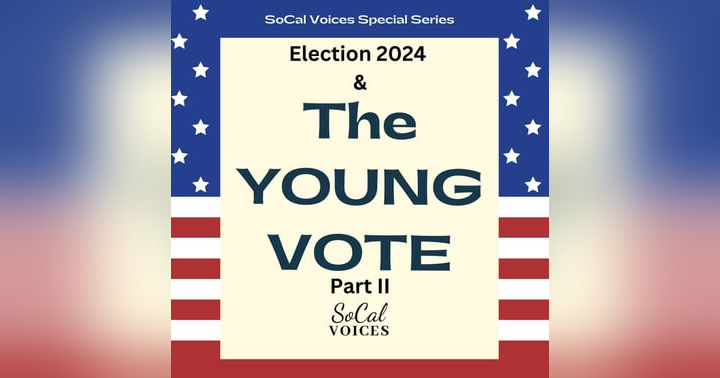Election 2024: The Young Vote - Part III

In contemporary American politics, the two-party system has become a defining characteristic of the electoral landscape. However, this binary framework has increasingly led to disillusionment among some younger voters, particularly those under 30, as they grapple with the limitations and frustrations of a system that often feels unrepresentative of their diverse views and values. The voices of young voters, such as 19-year-old first-time voter Jamari Davis, shed light on this discontent and the desire for a more inclusive political discourse.
In the final installment of SoCal Voices' three-part series, Election 2024: The Young Vote, Jamari's political stance exemplifies the growing sentiment among young Americans who identify as politically independent or centrist. He articulates a belief that individuals should vote for candidates based on their qualifications and policies rather than their party affiliation. This perspective is informed by his upbringing, where exposure to a variety of political views—from his grandmother's Democratic ideals to his daycare provider's Republican beliefs—has fostered a nuanced understanding of the political spectrum. Jamari's experience illustrates how early interactions with diverse viewpoints can shape a more flexible political identity, one that resists the rigid constraints of party loyalty.
The frustrations voiced by young voters like Jamari are rooted in the perception that the two-party system prioritizes power over progress. This is particularly evident in the context of pressing issues such as inflation and international conflicts. As Jamari notes in the episode, the current economic climate is challenging, with inflation affecting everyday life and the housing market posing significant challenges for young people. Additionally, the ongoing wars in Ukraine and Gaza raise profound ethical questions about the United States' role in global conflicts. For many young voters, the binary choice between candidates—especially in elections where the options may not fully align with their values—can feel inadequate and disheartening.
For some voters, the upcoming presidential election, between Vice President Kamala Harris and former President Donald Trump, highlights the limitations of the two-party system. Jamari reflects on his initial support for Trump, believing he might be more effective in avoiding conflict. However, he expresses skepticism about the likelihood of either candidate bringing about meaningful change in U.S. foreign policy or addressing the root causes of war. This ambivalence underscores a broader trend among young voters who find themselves disillusioned by the lack of genuine alternatives to the status quo.
For a new generation of voters, the challenge lies not only in navigating the current electoral framework but also in advocating for a more inclusive and representative political discourse that aligns with their diverse values and aspirations. As the November election approaches, the impact of this disillusionment on voter turnout and engagement will be crucial in shaping the future of American politics.
My main take-away from my conversation with Jamari and all voters, is the importance of every eligible person to participate in elections. The deadline to register to vote in California is October 21. You can register to vote on the California Secretary of State's website. Think you might be registered to vote but aren't sure? You can also confirm your voter registration status on that site. Once you're registered to vote, be sure that you vote by Election Day, November 5.
Listen to the episode on socalvoices.com or your favorite podcast player.


